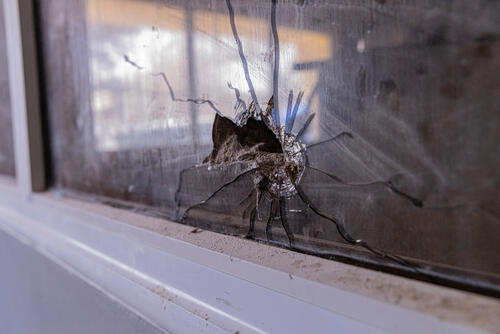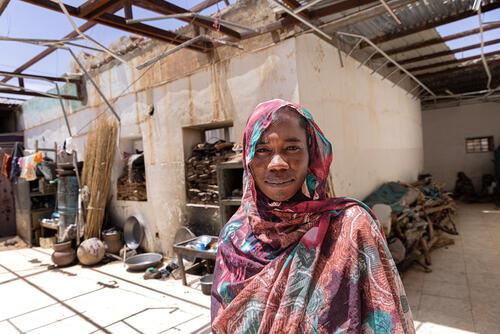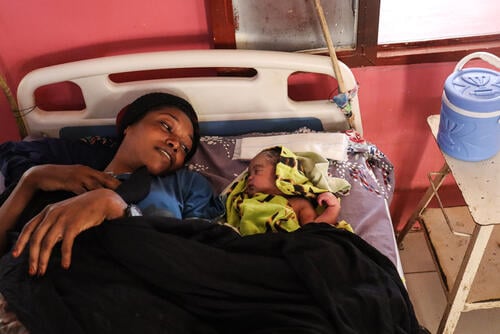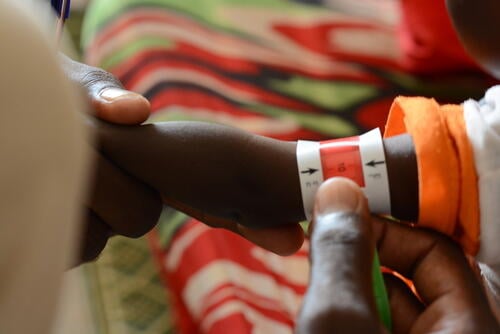As the fighting in Sudan between the Rapid Support Forces (RSF) and the Sudanese Armed Forces (SAF) began in April 2023, the displaced people of Al-Hasahisa camp, in Zalingei, capital of Central Darfur state, found themselves caught in the crossfire.
According to the United Nations, by November, the camp had been besieged by RSF for months, leaving the injured unable to seek medical care outside the camp, and blocking water and food supplies from reaching peoplehttps://data.unhcr.org/en/documents/download/103953.
The Hasahisa camp, which once housed an estimated 50,000 people — most already displaced in the early 2000s — eventually emptied as people managed to flee the relentless bombing, leaving behind damaged brick homes and ghost-like streets. With nowhere else to turn, they’ve now sheltered for months on end in looted and abandoned schools, banks, fire stations and other camps across the city.
I was bringing a patient to the hall of the operating theatre when the doctor was shot in the neck. He was doing a caesarean section. After this, the patient passed away in the hallway.Assma, a volunteer nurse
Widespread displacement and survival without assistance
On the night of 2 November, Aissa and her family boarded donkey carts and fled Hasahisa camp. Most of Aissa’s belongings had been stolen, leaving her with only a mattress, which was later lost on the road. She followed her mother and children as they led the way.
“We were chased and forced to leave,” says Aissa. “Some of our men were killed. Others were detained. Our things were taken and stolen. As we were leaving, we were stopped [by armed men] and had to wait until the morning. They tied [people] up and beat the young boys.”
For over six months, Aissa and her family have resided in a single shipping container at the ravaged Zalingei fire station. Like 6.5 million other displaced people in Sudan, they primarily depend on humanitarian aid that remains unavailable in many places. Surviving with unreliable jobs here and there, Aissa and her family don’t have proper access to water, food or essential services, including medical care.
“There is no way to make any money,” says Aissa. “We just go out and roam around the city. If you find someone you can do laundry for, you wash it and try to get some money.”
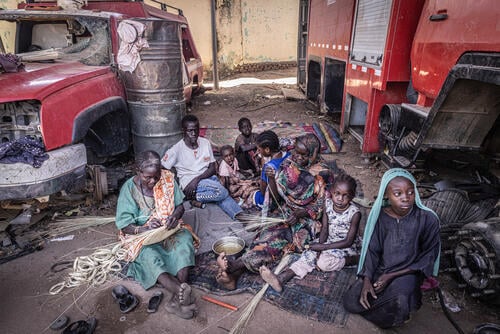
Across the street from the fire station, Najwa and her three children have taken shelter in the city’s looted bank with 30 other displaced people from Hasahisa camp. She’s created an illusion of home there: bank safes used as closets, bricked-up windows, once meant for sunlight, and windowsills now holding a few tattered bags and wilted plants.
“We are living in these conditions without a roof, and we have no food,” says Najwa, pointing at the torn sheets draped above the lobby. “But we’ve never received any assistance, not even a bar of soap. Soon the rainy season will come, and we don’t know where to go.”
Cut off from access to healthcare and medicine
In the heart of the city, the University of Zalingei — once a centre for students of medicine, agriculture and technology — now lies desolate. Bales of hay for donkeys are stored in the auditorium, while campus buildings are connected by laundry clotheslines.
Transformed into a makeshift shelter, more than a thousand people are living in the school´s classrooms and offices, mostly displaced from Hasahisa camp. Mainly farmers, they are now unable to regularly cultivate crops and make an income. The community relies on each other because of the absence of humanitarian assistance.
“We all make contributions and anyone participating can share [medication],” says Mohammed, one of the first to flee to the university. “We share with the community and treat the patients.”
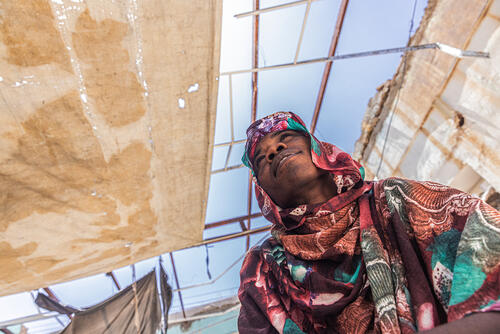
Only 10 minutes away, Khadija waits for her daughter Malaka to be discharged from the Zalingei Teaching Hopistal. It’s the first day Médecins Sans Frontières (MSF) teams have re-opened the rehabilitated emergency room, and Malaka is one of the first patients. Displaced and forced to sell her remaining belongings to earn money, Khadija hasn’t been able to buy medication for her daughter.
“I travelled for over an hour to Zalingei Teaching Hospital to receive treatment for my child, who tested positive for malaria,” says Khadija. “In Hasahisa camp, we would receive medication for free. Here in Zalingei, it’s not the same. But today, we received free medication.”
Supporting a collapsed health system
Amid the large-scale violence in Sudan, healthcare workers and facilities have been attacked and looted, leaving large portions of the health system damaged or non-functional. The sole remaining specialised healthcare facility in Central Darfur state, Zalingei Teaching Hospital, has also been looted multiple times during the war.
After another looting in May 2023, the Ministry of Health staff did their best to keep the hospital functional by mobilising volunteers across the city. One of them was nurse Assma. A few weeks after a looting in May, the hospital was attacked once again: this time resulting in the death of a patient.
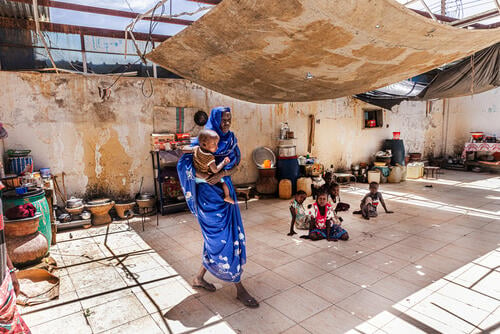
“I was bringing a patient to the hall of the operating theatre when the doctor was shot in the neck,” says Assma. “He was doing a caesarean. After this, the patient passed away in the hallway.”
To restore specialised care in the state, MSF teams are providing specialised care at the Zalingei Teaching Hospital and supporting the Ministry of Health by training and incentivising staff, as well as rehabilitating the emergency, maternity and paediatric departments.
In April, our teams provided over 900 emergency consultations, nearly 400 paediatric admissions, almost 100 safe deliveries, and treated over 50 children for malnutrition in the inpatient therapeutic feeding centre.
“The war has completely disrupted people’s access to healthcare in Sudan,” says Victor García Leonor, MSF emergency coordinator in Sudan. “Medicine and food prices have soared making it inaccessible for people — especially the displaced — and most health facilities are no longer functioning properly. At the same time, the country is facing a humanitarian void, which is further exacerbating the huge unmet healthcare needs.”
Despite Sudan being one of the world’s largest displacement crises, many humanitarian organisations have not returned since evacuating after the onset of the war last year. Today, after more than one year since the start of the war, Sudan continues to face a humanitarian void.
MSF continues to call on all warring parties and belligerents to respect the special protections that healthcare workers and medical facilities are provided under International Humanitarian law, as well as ensure safe humanitarian access to all areas of Sudan, without exception, and stop blockages of supplies and staff.
In addition, to ensure humanitarian assistance reaches people, the United Nations must urgently scale up and focus on clear results related to increasing access so that they actively contribute towards enabling a rapid and massive scale-up of humanitarian assistance.
MSF currently works in and supports more than 30 health facilities in nine states in Sudan: Khartoum, Al Jazirah, White and Blue Nile, Al Gedaref, West Darfur, North, South and Central Darfur, and Red Sea. Our teams have also recently intervened in Kassala. We run activities in both SAF- and RSF-controlled areas. We provide trauma care, maternal and paediatric care and treat malnutrition alongside other healthcare services. MSF teams are also supporting Sudanese refugees and returnees in South Sudan and eastern Chad.



